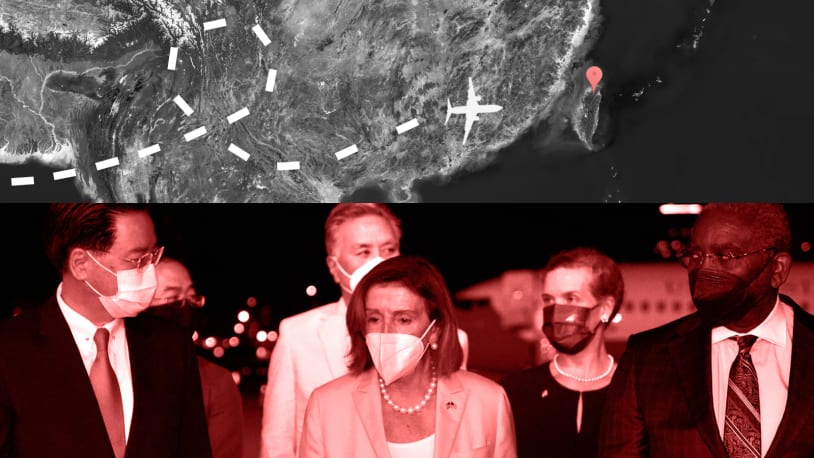
Should Pelosi have gone to Taiwan?
Nancy Pelosi (D-Calif.) officially landed in Taipei, Taiwan Tuesday evening, prompting outrage (and even a military show of force) from Chinese officials. Furious the speaker of the House is using her trip to Asia to diplomatically engage with a territory Beijing considers its own, the Chinese Ministry of Foreign Affairs has claimed the visit damages “the political foundation of China-U.S. relations,” “seriously infringes upon China’s sovereignty and territorial integrity,” and “gravely undermines peace and stability across the Taiwan Strait,” it said in a statement released after she landed. And it’s not like Beijing didn’t know the speaker was coming — such a Taiwan stopover has been speculated about for weeks. But at the end of the day, however, should Pelosi even be doing this? Do the pros of her visit, slated to end Wednesday, outweigh the cons? Here’s a taste of what experts and pundits have to say about the island expedition, the first for a House speaker in 25 years:
Think of Ukraine
For starters, Pelosi’s visit risks further complicating the war in Ukraine, especially considering U.S. attempts to ensure China’s neutrality. Beijing and Moscow are allies, but the Biden administration has, “by all indications,” successfully convinced the former to hold off on providing Russian President Vladimir Putin with military aid that might perhaps bolster the chances of his invasion. “Given all of that,” Thomas Friedman argued in The New York Times, “why in the world would the speaker of the House choose to visit Taiwan and deliberately provoke China now … ?”
The Ukraine war is “SO not over, SO not stable, SO not without dangerous surprises that can pop out on any given day,” Friedman continued. “It is Geopolitics 101 that you don’t court a two-front war with the other two superpowers at the same time.”
Think of China, too
Not only might the trip exacerbate the war in Ukraine, it could also serve as the “single spark that ignites the “combustible situation” between the U.S. and China, Bonnie Glaser of the German Marshall Fund of the United States and Zack Cooper of the American Enterprise Institute wrote for the Times.
“Neither side needs a war. And from a U.S. strategic standpoint, this is a particularly bad issue to pick a fight with China over,” they said.
Plus, will this even help?
Meanwhile, one also has to wonder what Taiwan might get out of all this attention. Yes, it’s true the visit from Pelosi will likely signal U.S. support for the island, but outside of that, how does Taiwan benefit, if at all?
“Other than grandstanding, there are no tangible benefits attached to Pelosi’s visit,” Defense Priorities fellow Daniel DePetris wrote for Time. “The costs, however, will be a U.S.-China relationship that continues to travel down the path of a full-blown strategic rivalry, where responsible competition and dialogue are increasingly viewed by both sides as a sign of weakness.”
Writing for the Los Angeles Times, political science professor Dennis Hickey appeared to share DePetris’ attitude: “It is difficult to understand how a Pelosi trip would help Taiwan. If the dispute over Pelosi’s travel plans spirals out of control, the biggest loser will be Taiwan.”
Instead of “high-profile but ultimately empty visits,” added the Financial Times Editorial Board, the U.S. “should in future focus on carefully-coordinated actions that have genuine value in shoring up Taiwan’s security,” like bolstering weapons supplies and training.
It’s a gamble, but it’s her right
Pelosi’s visit puts the Biden administration in a tough spot — even if White House officials preferred she hadn’t gone, urging her to cancel the trip could’ve played right into Beijing’s hands and convinced them they won the stand-off. And President Biden couldn’t come right out and publicly encourage the speaker to delay either, lest he look too wishy-washy on Taiwan. Ultimately, the best-case scenario may have been some sort of compromise between Pelosi and the Biden team — but either way, the speaker has every right to fly to Taiwan and every right to visit the island, posited Washington Post columnist Josh Rogin.
“In democracies, the people and their representatives can visit other democracies whenever they want, without being punished by neighboring dictatorships,” Rogin wrote. “That’s a strength, not a weakness, of free societies.”
She should have gone eventually — but maybe not now
Pelosi has both a right and an obligation to “express solidarity with democratic Taiwan as she sees fit,” The Washington Post Editorial Board argued, but “[t]here is a time and a place for everything.” And that moment was … maybe not right now. It probably won’t be soon, either, “but it should be eventually, when her presence will do the most to support Taiwan’s legitimate aspirations and the least to reinforce China’s illegitimate bullying.”
Arguing somewhat similarly, The Wall Street Journal Editorial Board opted to address not the timing of Pelosi’s visit but instead how it underscores the need to better address and handle Taiwan as a “U.S.-China flashpoint.” Regardless of how the speaker’s trip plays out, “China’s military threats show that the status of Taiwan and its protection are fast becoming emergencies,” the board said. For the U.S., the “best response” here would be “at long last” to take the defense of the island “seriously.”
Nancy Pelosi (D-Calif.) officially landed in Taipei, Taiwan Tuesday evening, prompting outrage (and even a military show of force) from Chinese officials. Furious the speaker of the House is using her trip to Asia to diplomatically engage with a territory Beijing considers its own, the Chinese Ministry of Foreign Affairs has claimed the visit damages…
Nancy Pelosi (D-Calif.) officially landed in Taipei, Taiwan Tuesday evening, prompting outrage (and even a military show of force) from Chinese officials. Furious the speaker of the House is using her trip to Asia to diplomatically engage with a territory Beijing considers its own, the Chinese Ministry of Foreign Affairs has claimed the visit damages…